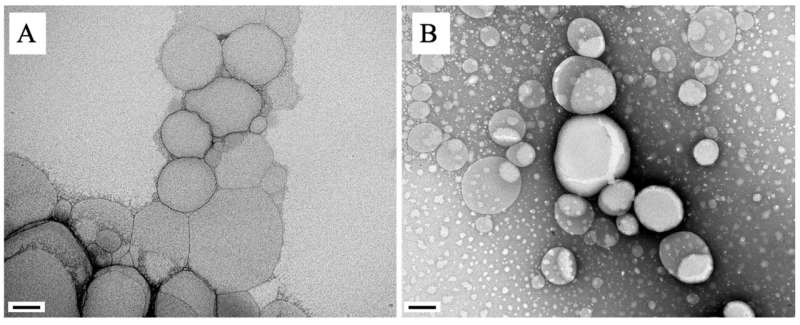
[ad_1]

Lipid nanoparticles viewed under a microscope, (A) without and (B) with encapsulated active principles. Credit: IB-CLP
A new treatment strategy developed by researchers at São Paulo State University (UNESP) could revolutionize the treatment of visceral leishmaniasis, a neglected tropical disease (NTD) spread by sandflies. According to the World Health Organization (WHO), approximately 12 million people worldwide suffer from the disease, and between 700,000 and 1 million new cases occur annually.
Involves the use of techniques developed by researchers. Lipid nanoparticles To administer Leupol, a chemical compound known to kill the Leishmania protozoan parasite that causes the disease. Lupeol is a triterpene found in many vegetables and fruits, for example mangoes, grapes and strawberries, green peppers and olives.
In animal tests, the strategy is capable of eliminating Leishmania from infected organs. The results are reported in a topic Published in Journal Pharmaceuticals.
There are three main forms of leishmaniasis. According to the WHO, the visual form is the most serious, with a mortality rate of up to 95 percent if untreated, and 10 percent even with treatment. The others are cutaneous leishmaniasis (the most common, usually causing skin ulcers), and mucocutaneous leishmaniasis (affecting the mouth, nose, and throat).
Available treatments – mainly based on the use of pentavalent antimonials or amphotericin B – have severe side effects, particularly affecting the heart, liver and kidneys. Some drugs for leishmaniasis are very expensive, a heavy burden on the public health system, and can develop drug resistance in the parasite if used inadequately. Researchers therefore emphasize the urgent need to find or develop new active compounds in the article, some of which have been identified in plants.
In the study, researchers from the Institute of Biosciences at UNESP’s Coastal Experimental Campus (IB-CLP) in São Vicente created a new technique that involved delivering lyophil into lipid nanoparticles.
“Lupol has been shown to kill forms of Leishmania in vitro, but it is not very soluble in physiological solutions, which would limit its bioavailability in vivo,” said postdoctoral researcher Jessica Adriana de Jesus, first author of the article. Limits availability.” In IB-CLP-UNESP.
“Encapsulating it in lipid nanoparticles solves the problem of crossing biological barriers, maximizing therapeutic effect and delivering drugs to targets, which in the case of visceral leishmaniasis are the spleen, liver and bone marrow. “Nanocarriers are just a delivery vehicle. They get to the target site, with the right pH they open up and release the drug.”
first time
The experiments involved four groups of hamsters infected with Leishmania infantum and treated for ten days. The first group was given only Leupol, the second received nanoparticles containing Leupol, the third was given blank nanoparticles, and the fourth received only placebo. Spleen, liver, blood and plasma of the animals were then sampled for biochemical, physiopathological and parasite load analysis.
As expected, lipid nanoparticles carrying Leupol were more effective than Leupol alone in eliminating visceral Leishmaniasis parasites from the spleen and liver: administration of nanoparticles with Leupol for ten days reduced the number of parasites by 99.9%. Percentage decrease.
“Furthermore, animals treated in this manner showed minimal histopathological changes in the spleen and liver. For the first time, we demonstrated that this compound is highly effective in treating the disease and that it is an important compound that should be considered.”
Nanoparticles containing Leupol were administered by intraperitoneal injection. The group now plans to develop a nanocarrier for oral administration, allowing the patient to take the drug at home, as well as a version to treat cutaneous leishmaniasis conditions.
More information:
Jéssica Adriana Jesus et al, Nanostructured Lipid Carriers as Lupeol Delivery for Treatment of Experimental Visceral Leishmaniasis, Pharmaceuticals (2023). DOI: 10.3390/ph16121646
Reference: Natural substance-containing nanoparticles treat visceral Leishmania with few side effects (2024, February 20) Accessed February 21, 2024 at https://phys.org/news/2024-02-nanoparticles-natural-substance-visceral Retrieved from -leishmaniasis.html
This document is subject to copyright. No part may be reproduced without written permission, except for any fair dealing for the purpose of private study or research. The content is provided for informational purposes only.
[ad_2]


